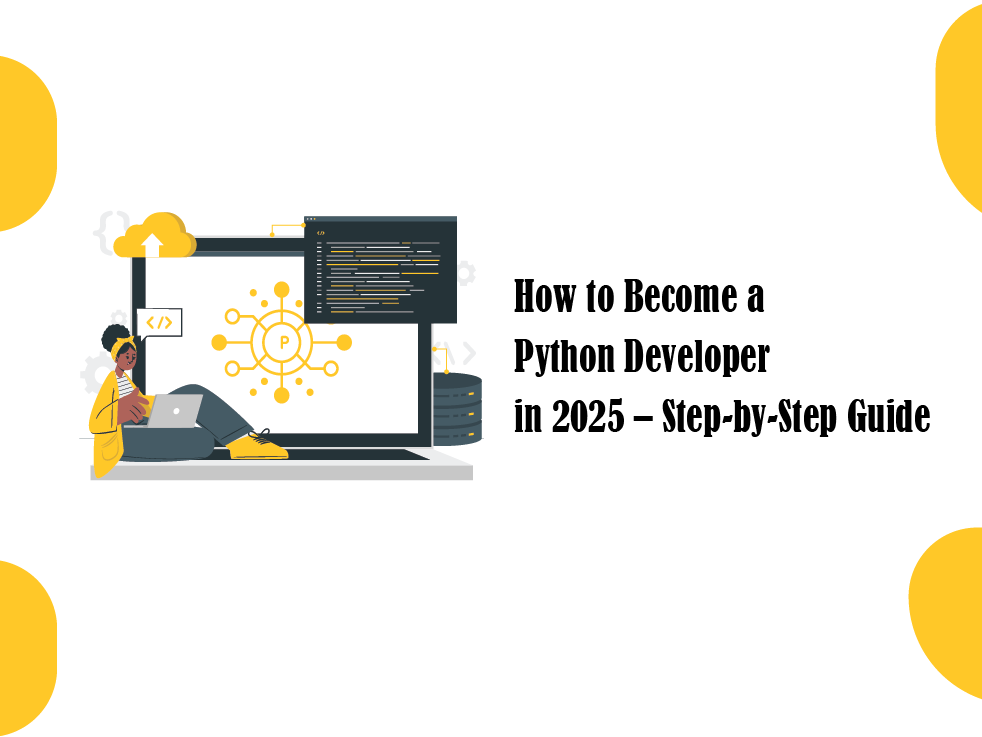Introduction
Python development is a high-demand career in web development, data science, AI, and automation. Learning Python can open doors to lucrative job opportunities. This guide provides a structured roadmap to becoming a Python developer in 2025.

Step-by-Step Guide to Becoming a Python Developer
1. Learn Python Basics
Understanding the core concepts of Python is essential. Learn:
- Syntax and Variables – Writing basic Python code
- Data Types and Operators – Numbers, strings, lists, dictionaries
- Control Flow – Conditional statements and loops
2. Master Data Structures and Algorithms
Efficient programming requires knowledge of data structures. Focus on:
- Lists, Tuples, and Dictionaries – Data storage and manipulation
- Sorting and Searching Algorithms – Optimizing code performance
- Recursion and Dynamic Programming – Advanced problem-solving techniques
3. Work with Python Libraries and Frameworks
Different applications require different libraries. Learn:
- Flask & Django – Web development frameworks
- Pandas & NumPy – Data manipulation and analysis
- TensorFlow & PyTorch – Machine learning and AI applications
4. Understand Object-Oriented Programming (OOP)
Databases are essential for backend development. Learn:
- SQL & PostgreSQL – Structured data storage
- MongoDB – NoSQL database for large datasets
- ORM (Object-Relational Mapping) – Efficient database handling
6. Learn API Development
APIs allow applications to interact seamlessly. Master:
- RESTful APIs – Designing structured APIs
- FastAPI – High-performance API development
- Authentication & Authorization – Securing APIs using JWT and OAuth
7. Explore Automation and Scripting
Automation is a key advantage of Python. Practice:
- Web Scraping – Using BeautifulSoup and Scrapy
- Automating Tasks – Writing Python scripts
- Selenium – Automating browser actions
8. Get Hands-On with DevOps and Cloud Computing
Deploying applications requires cloud and DevOps skills. Learn:
- Docker & Kubernetes – Containerization and orchestration
- AWS & Google Cloud – Cloud computing services
- CI/CD Pipelines – Automating software deployment
9. Work on Real-World Projects
Practical experience is key. Build:
- Web Applications – Using Flask or Django
- Data Science Projects – Analyzing real-world datasets
- Automation Scripts – Enhancing productivity through automation
10. Build a Portfolio and Apply for Jobs
A strong portfolio boosts job opportunities. Focus on:
- GitHub & GitLab – Hosting and sharing code
- Freelance Projects – Gaining real-world experience
- Contributing to Open Source – Improving skills and visibility
Conclusion
Becoming a Python developer in 2025 requires continuous learning and hands-on experience. Mastering Python fundamentals, frameworks, and tools ensures a strong career foundation. Follow these steps to kickstart your Python development journey.
FAQ
1. How long does it take to become a Python developer?
It typically takes 6-12 months to become proficient in Python development, depending on your learning pace and prior experience.
2. Do I need a degree to become a Python developer?
No, a degree is not mandatory. Many Python developers are self-taught or have completed online courses and bootcamps.
3. Which Python framework is best for beginners?
Flask is beginner-friendly due to its simplicity. Django is more powerful but has a steeper learning curve.
4. What tools do Python developers use?
Common tools include PyCharm, VS Code, Jupyter Notebook, Git, and libraries like Pandas, NumPy, and TensorFlow.
5. How can I get my first Python developer job?
Build a strong portfolio, contribute to open-source projects, and network with professionals. Apply for internships or entry-level positions to gain experience.
That’s a wrap!
Thank you for taking the time to read this article. I hope you found it informative and enjoyable. If you did, please consider sharing it with your friends and followers. Your support helps me continue creating content like this!
Thanks!
Kamal Pankaj😊



